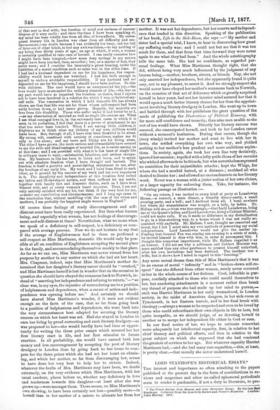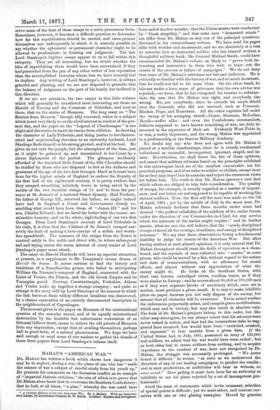LORD STANHOPE'S HISTORICAL ESSAYS.*
THE interest and importance so often attaching to the papers published at the present day in the form of contributions to re- views and magazines and other so-called ephemeral periodicals seem to render it pardonable, if not a duty to literature, to pre- * The French Retreat from Moscow, and other Historical Essays. By the late Shut Stanhope. Collected from the Quarterly Review and Fraser's Magattne. Loudon: John Murray. 1878. serve some of the best of these essays in a more permanent form. Sometimes, however, it becomes a difficult question to determine how far this republication should be carried, and cases present themselves not unfrequently in which it is scarcely possible to say whether the ephemeral or permanent character ought to be allowed to predominate in forming our judgment. The late Lord Stanhope's fugitive essays appear to us to fall within this category. They are all interesting, but we doubt whether the idea of republishing them would have been entertained, if they had proceeded from the pen of any other writer of less reputation than the accomplished historian whose loss we have recently had to deplore. Any writing of Lord Stanhope's, however, is always graceful and pleasing, and we are not disposed to grumble that the balance of judgment on the part of his family has inclined in this direction.
If we are not mistaken, the two essays in this little volume which will generally be considered most interesting are those on Harold of Norway and the Countess of Nithsdale, and next to these, that on the statue of Memnon. The long essay on "The Retreat from Moscow," though ably executed, refers to a subject which is not very likely to excite vivid interest in readers of the pre- sent day, and the paper on the "Legend of Charlemagne" is too slight and discursive to merit its rescue from oblivion. In drawing the character of Lady Nithsdale, and doing justice to her disinter- ested and unpretending devotion to an unworthy husband, Lord Stanhope finds himself on his strong ground, and is at his best. He gives us not only the people, but the atmosphere of the time, just as it might be gathered up and transmitted to his Court by a clever diplomatist of the period. The glimpses incidently afforded of the wretched little Court of the Old Chevalier should be studied by those who are disposed to fret at the dullness and grossness of the age of the two first Georges. Hard as it must have been for the higher minds of England to endure the Royalty of the first half of the eighteenth century, it is pretty evident that they escaped something infinitely worse in being saved by the results of the two Jacobite risings of '15 and '45 from the pre- sence at St. James's of a restored Stuart dynasty. Had Frederic, the father of George ILL, survived his father, we might indeed have had in England a Court and Government closely re- sembling what would have been those of "James JIL" and his son, Charles Edward ; but we fared far better with the coarse, un- attractive honesty, and on the whole, right feeling of our two first Georges. From Lord Stanhope's account of Lord Nithsdale in his exile, it is clear that the Cabinet of St. James's escaped nar- rowly the fault of making a hero-martyr of a selfish and worth- less spendthrift. The romance of the escape from the Tower is centred solely in the noble and clever wife, to whose subsequent sad and trying career the warm interest of every reader of Lord ptanhope's paper must attach. The essay on Harold Hardrada will have an especial attraction at present, as a supplement to Mr. Tennyson's recent drama of Harold the Saxon. It seems curious to find the history and traditions of a Scandinavian prince, who failed in anticipating William the Norman's conquest of England, connected with the Lions of Venice, the Pirams, and the old Greek Empire and its Varangian guard. Norway, Constantinople, Yorkshire, Athens and Venice make up together a strange company ; and quite as strange is the story told by Lord Stanhope of the manner in which the link between these widely different localities was discovered, by a chance excavation of an entirely disconnected inscription in the neigbhoarhood of Copenhagen.
The account given in the paper on Memnon of the unintentional creation of the oracular sound, and of its equally unintentional destruction by the laudable but unfortunate restoration of an Oriental Gilbert Scott, seems to relieve the old priests of Memnon from any imputation, except that of availing themselves, perhaps half in good-faith, of a natural phenomenon. We hope we have said enough to send some of our readers to gather the details of these three papers from Lord Stanhope's volume itself.



































 Previous page
Previous page